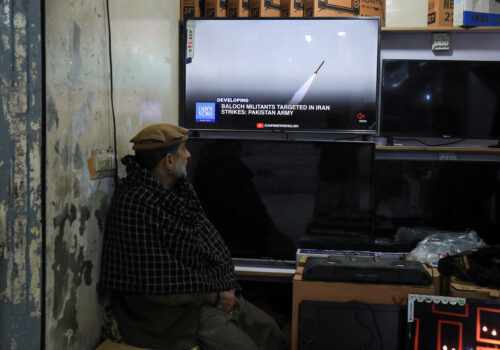Davos Dispatch: The case for optimism amid global upheaval
DAVOS—Amid the geopolitical gloom that pervaded the World Economic Forum here this past week—with intractable wars in Europe and the Mideast and unsettling tensions in Asia—International Monetary Fund Managing Director Kristalina Georgieva made a case for optimism, quoting the legendary economist John Maynard Keynes.
Georgieva reminded a select group of global political, business, and civil society leaders of Keynes’ words from a 1930 essay, written against the backdrop of the Great Depression, the rise of communism and fascism, and national and international despair (the meeting was off-record, but Georgieva approved this to be shared publicly):
“I predict that both of the two opposed errors of pessimism which now make so much noise in the world will be proved wrong over time: the pessimism of the revolutionaries who think that things are so bad that nothing can save us but violent change, and the pessimism of the reactionaries who consider the balance of our economic and social life so precarious that we must risk no experiments.”
For argument’s sake, let’s consider as today’s “revolutionary pessimists” Russian President Vladimir Putin, his enablers in Beijing, and his authoritarian brethren in North Korea and Iran—plus Tehran’s Mideast proxies Hamas, the Houthis, and Hezbollah. Pursuing violent change is their calling card.
Standing opposite them are countries Keynes might classify as the risk-averse “pessimistic reactionaries”: the United States, Europe, and other global forces for good. Fearing Russian escalation, they haven’t been sufficiently bold in providing Ukraine the scale or nature of military support it needs to win. In the Mideast and beyond, they have thus failed to develop concepts or marshal coalitions equal to what European Commission President Ursula von der Leyen called “the greatest risk to global order” since World War II.
A new era dawning
My own case for geopolitical optimism, drawn from my week in Davos, starts with US National Security Advisor Jake Sullivan’s statement here that “we’re in the early years of a new era,” and that the United States and its global partners have all the tools to shape it, if only they can summon common cause and political will.
At such times of shifting geopolitical tectonic plates, levels of volatility are typically matched by the potential to leverage unfolding crises and challenges to steer history. Our times are no exception. It’s leadership that makes the difference—and it will be so again.
On that score, it’s worth reflecting on the first years of a new era that became known as the Cold War, from the end of World War II in 1945 to the Cuban Missile Crisis of 1962. It was relative US consistency of action alongside allies, and prudent but bold action, that allowed the United States and United Kingdom to break the Soviet blockade of Berlin in 1948, to keep West Berlin free despite the Berlin Wall’s construction in 1961, and finally to avoid nuclear war over Cuba in 1962.
In those same years, Washington alongside its partners built the transatlantic, European, and global institutions that would bring the world decades of expanding democracy and prosperity, as well as nearly eighty years without major-power conflict.
Sullivan defined our now-unfolding, post-Cold War era as one that is “marked by a simple thing to say but a very complex reality, which is strategic competition in an age of interdependence.” It’s not as catchy as “the Cold War,” and it’s far more complex, but it will be no less decisive.
“We’re at the start of something new,” said Sullivan. “We have the capacity to shape what it looks like. . . We have the tools to do it. The question is, are we prepared to put those to work? That is a question of political will within our countries and then across our countries. And those who are working to summon that political will need to band together to produce a common, coherent response to the great challenges that we face in 2024.”
Those 2024 geopolitical challenges are to head off the political threats to US and European military and economic support for Ukraine; to rapidly return the Mideast from war to “regionalizing” security efforts and expanding normalization with Israel; and to further stabilize relations with China so as to allow a fierce competition for the global future, but one that is free of violent conflict.
In Davos, another geopolitical uncertainty dominated a great many conversations, given the crucial nature of US leadership, and that was how elections this November will contribute to the United States’ appetite and capability to galvanize common cause—as it did after World War II but failed to do after World War I (with disastrous consequences).
Momentum for Ukraine
On geopolitics, the danger in 2024 is that American, European, and Ukrainian fatigue—combined with unexpected Russian resilience in the face of economic sanctions and some 350,000 casualties—would dramatically reduce military and economic support for Kyiv. That, in turn, would favor Putin and all the global bad actors he represents, who would be encouraged by the failure of Western resolve.
For me, one of the great surprises of Davos week was a positive shift in pro-Kyiv momentum. Both US and European politicians assured Ukrainians that their legislatures in the coming days would overcome minority opposition—from Hungary’s Viktor Orbán in Europe and a Republican minority in the US House—to funding packages for Ukraine that together would exceed $100 billion.
Ukrainian President Volodymyr Zelenskyy probably got the biggest ovation here, having substituted a black outfit for his usual olive fatigues. Applause meters don’t win wars, but he had his audience when he said of Putin, “Regimes like his exist as long as they wage wars. And we—we all in the free world—exist as long as we can defend ourselves.”
Without naming countries, he urged those who had held back certain weapons systems because they feared Putin’s response to see now that the greater risk is in failing to give Ukraine what it needs to prevail. “Because of ‘don’t escalate,’” he said, “time was lost. The lives of many of our most experienced warriors, who fought since 2014, were lost. Some opportunities were lost.”
All over town, US, European, and Ukrainian officials pushed back on the narrative that Ukraine wasn’t making progress and Putin was gaining. US Secretary of State Antony Blinken stressed that Ukraine had retaken half of the territory Russia had gained, that it had opened the Black Sea and pushed back the Russian navy, and that Russia was weaker economically, diplomatically, and militarily (having lost half of its conventional capability as of last summer). While Putin wanted to divide NATO, he instead had unified it and enlarged it to Finland and soon Sweden. Ukraine in December began its European Union (EU) membership talks.
There is also growing political support from both sides of the Atlantic for providing Russia’s $300 billion of frozen assets to Ukraine. Given that the combined gross domestic products and defense budgets of Ukraine’s supporters are many times larger than Russia’s, with the right political will, it would not be difficult over time to prevail over Moscow.
Hidden Mideast opportunities
The source of my contrarian Mideast optimism—even amid this week’s US strikes on the Houthis and a Pakistani-Iranian exchange of military blows—comes from the lack of any good alternative. One American business leader, with a long history in the Middle East, told me he thought Israel and its neighbors had a shot at a comprehensive peace deal and regional security arrangement that could endure for a century.
Israelis will come to recognize that even if they can eradicate Hamas, they won’t ever be secure without a regional security agreement and expanded normalization with their Arab neighbors, building upon the Abraham Accords. And that won’t be possible without a path-certain to a Palestinian state.
“You now have something you didn’t have before,” Blinken told the New York Times’ Tom Friedman on stage here, “and that is Arab countries and Muslim countries even beyond the region that are prepared to have a relationship with Israel in terms of its integration, its normalization, its security, that they were never prepared to have before. . . to make the necessary commitments and guarantees, so that Israel is not only integrated but it can feel secure.”
Despite the growing regional uproar against Israel’s Gaza war, which has resulted in more than twenty thousand Palestinian deaths, Saudi Foreign Minister Faisal Bin Farhan told the World Economic Forum that his country remains committed to normalization with clear terms and commitment to a Palestinian state.
Stabilizing relations with China
On China-US relations, the pessimists fear the recently stabilized relationship will inevitably veer off the rails, given the fundamental differences between Washington and Beijing. The goal here must be to give the short-term gains of the past year, culminating in the Joe Biden-Xi Jinping meeting in San Francisco, a more lasting nature that will allow the fundamental strengths of the United States and its partners to win out over time.
Here Blinken underscored the greater US “position of strength” through its domestic investments (such as the Inflation Reduction Act and the CHIPS and Science Act), the reenergizing of partnerships and alliances (the Quad and South Korean-Japanese-US relations), and a greater convergence with other countries—particularly in Europe—in recognizing the perils posed by China.
The Trump question
On the issue of the US election, the Davos consensus (drawn from my own conversations and several requests to raise hands during meetings to indicate opinion) was that former President Donald Trump would win and that would be a bad thing for the historic moment. It was only toward week’s end that Europeans’ fear about being left alone to deal with Putin turned toward a more reasonable faith in American democracy and in their own need to rise to the historic challenge.
“We should refrain from treating elections, whether in Europe or in the US, as a source of insecurity and instability, as a problem,” Austrian Foreign Minister Alexander Schallenberg said, according to Politico. “Elections are the very heart of our democratic system.”
Said EU Trade Commissioner Valdis Dombrovskis, who served three terms as Latvian prime minister, “We need to ramp up our own capabilities. We need to clearly be at a much higher level of preparedness as regards military capabilities but also as regards economic security and economic resilience.”
Returning to Keynes, what gives me concern is that his essay came at the front end of a decade that ended catastrophically: with World War II and the Holocaust. It was only after seeing those horrors that the United States and its partners rose to create the institutions and invent the rules-based order that produced so much peace and prosperity for decades thereafter.
For the case for optimism to succeed, those faced with the weightiest decisions must recognize the long-term consequences of inaction. The failure to take greater risks in arming Ukraine or to replace failed Mideast approaches with more innovative solutions would be the riskiest course of all.
Frederick Kempe is president and chief executive officer of the Atlantic Council. You can follow him on Twitter @FredKempe.
THE WEEK’S TOP READS
#1 Global Risks Report 2024
World Economic Forum
For an understanding of what the world faces in 2024 and beyond, look no further than the World Economic Forum’s meticulously researched “Global Risks Report.”
This year’s report found that “the majority of respondents [to a WEF survey] (54%) anticipate some instability and a moderate risk of global catastrophes, while another 30% expect even more turbulent conditions. The outlook is markedly more negative over the 10-year time horizon, with nearly two-thirds of respondents expecting a stormy or turbulent outlook.”
The report also identified the biggest risk for the next two years to be “misinformation and disinformation,” but over the next ten years, climate-related crises will become the dominant risks. Read more →
#2 A ‘multipolar’ world defies the ‘rules-based’ order
Gideon Rachman | FINANCIAL TIMES
Part of the Financial Times’ must-read collection on “The World 2024,” Gideon Rachman’s insightful analysis examines the rhetoric of global power distribution.
“In the battle for global influence, all sides have their jargon,” Rachman claims. “The US and allies talk of the ‘rules-based international order’ (RBIO). Russia and China prefer a ‘multipolar’ world. Subrahmanyam Jaishankar, India’s astute foreign minister, recently split the difference by talking about the need for a ‘multilateral rules-based international order.’”
Rachman writes, “In different ways, the wars in Ukraine and Gaza—as well as the tensions in the South China Sea and the battle for opinion in the Global South—all involve this rhetorical struggle to shape the world order and the power realities that underpin it.” Read more →
#3 2024 Edelman Trust Barometer Global Report
Edelman Trust Institute
This year’s Trust Barometer reveals a fascinating trend as trust in non-governmental organizations, business, government, and media hovers at 56 percent globally—but with a big divide between the developed and developing worlds. In developing countries, 63 percent of citizens trust those institutions, while that figure stands at 49 percent in developed countries. In the past year, trust among US citizens has dropped from 48 percent to 46 percent.
As the world heads into a year in which half the population votes, this report highlights concerning trends of declining faith in governments and institutions among liberal democracies. (Note: Edelman CEO Richard Edelman serves on the Atlantic Council board of directors.) Read more →
#4 The Quiet Transformation of Occupied Ukraine
David Lewis | FOREIGN AFFAIRS
In this urgent piece, David Lewis calls attention not to Ukraine’s frontline, but to its occupied territory.
“This administrative occupation is less well known than the violence and human rights abuses that accompany it,” Lewis writes. “But Russia’s war in Ukraine extends well beyond its ruthless missile and drone strikes, its legions of soldiers, and its bellicose rhetoric. In occupied Ukraine, bureaucrats have been effective at enforcing the compliance of locals. Even as some people resist, authorities impose Russian education, cultural indoctrination, and economic and legal systems to rope these lands ever more tightly to Russia. The longer Russia occupies these territories, the harder it will be for Ukraine to get them back.”
As the West continues to “squabble” over aid to Ukraine, this piece is a reminder that Russia is ardently continuing its war. Read more →
#5 Geopolitical risks overshadow economic optimism in Davos
Sam Fleming | FINANCIAL TIMES
To understand the anxiety that pervaded this year’s World Economic Forum, read Sam Fleming’s smart reporting, which uncovers its origins, among them the US presidential election in November, continuing conflicts in Ukraine and the Middle East, and the overall shift in priority towards national security and resilience rather than economic efficiency.
“The economic backdrop to this week’s Davos meetings was far more promising than many anticipated a year ago,” Fleming writes. “But if the tone of discussions at the World Economic Forum is anything to go by, nobody is ready to celebrate.” Read more →
Atlantic Council top reads
Image: People walk outside during the 54th annual meeting of the World Economic Forum, in Davos, Switzerland, January 18, 2024. REUTERS/Denis Balibouse


